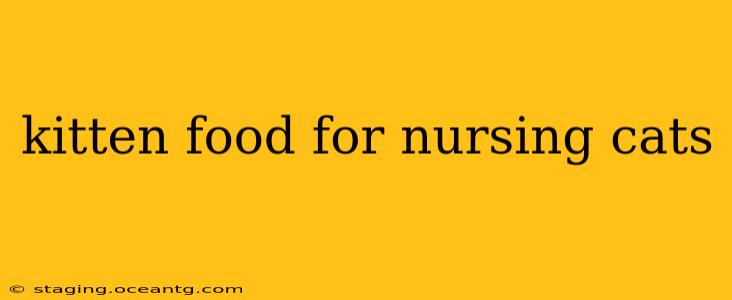Nursing cats have incredibly high nutritional needs, exceeding even those of pregnant cats. Providing the right food is crucial for both the mother's health and the kittens' growth and development. This comprehensive guide explores the best kitten food options for nursing mothers, addressing common concerns and misconceptions.
What Makes Kitten Food Ideal for Nursing Cats?
Nursing cats require significantly more calories and essential nutrients than usual. Kitten food is formulated to meet these heightened demands, providing a higher concentration of protein, fat, and vital vitamins and minerals compared to adult cat food. The increased protein supports milk production, while the fat provides the necessary energy for the demanding process of nursing. Essential vitamins and minerals are crucial for the mother's health and to ensure healthy kitten development.
What to Look for in Kitten Food for Nursing Mothers
Choosing the right food involves careful consideration of several factors:
- High-Quality Protein: Look for kitten food with high-quality animal protein sources like chicken, turkey, or fish, listed as the primary ingredient. Avoid fillers like corn, wheat, or soy.
- Fat Content: A moderate-to-high fat content is vital for energy. Check the nutritional information to ensure sufficient fat levels.
- Essential Nutrients: Pay close attention to the listed vitamins and minerals, ensuring they meet or exceed the recommended daily allowances for nursing cats. Look for added taurine, an essential amino acid crucial for feline health.
- Calorie Density: Because nursing cats need a significant increase in calories, choose a food with higher calorie density to help them meet their energy needs without overfeeding.
- Digestibility: Opt for highly digestible food to minimize digestive upset and ensure maximum nutrient absorption, both for the mother and the kittens through her milk.
How Much Kitten Food Should a Nursing Cat Eat?
There's no one-size-fits-all answer. The amount depends on several factors including the cat's size, breed, activity level, and the number of kittens she's nursing. Start with the feeding guidelines on the food package, but be prepared to adjust based on observation. If the mother cat seems underweight or is losing weight, gradually increase the food amount. Conversely, reduce the amount if she appears overweight. Consult with your veterinarian for personalized recommendations.
Can I Feed My Nursing Cat Adult Cat Food?
While adult cat food might seem like a convenient option, it's generally not recommended for nursing mothers. Adult cat food lacks the increased levels of protein, fat, and essential nutrients necessary to support the energy demands of lactation and healthy kitten development. Using adult cat food can lead to nutritional deficiencies for both the mother and the kittens.
What About Wet vs. Dry Kitten Food?
Both wet and dry kitten foods can be suitable options. Wet food often has a higher moisture content, which can be beneficial for hydration, especially during lactation. However, dry food can be more convenient and may help with dental health. Many cat owners choose to offer a combination of both. Observe your cat's preferences and adjust accordingly.
My Cat Isn't Eating Enough Kitten Food. What Should I Do?
If your nursing cat isn't consuming enough kitten food, consult your veterinarian immediately. There could be underlying health issues affecting her appetite, or she might need supplemental nutrition. Your veterinarian can help determine the cause and recommend appropriate treatment or additional support.
Should I Give My Nursing Cat Supplements?
In most cases, a high-quality kitten food provides all the necessary nutrients. However, your veterinarian might recommend specific supplements based on your cat's individual needs and health status. Do not administer any supplements without consulting your veterinarian first.
Choosing the Right Brand: Is There a "Best" Kitten Food for Nursing Cats?
Numerous reputable brands offer excellent kitten food. The "best" option depends on individual cat preferences and your budget. Look for brands that prioritize high-quality ingredients and transparent labeling. Read reviews and compare nutritional information to find a food that suits your cat's needs.
This guide provides a starting point for selecting the appropriate kitten food for your nursing cat. Remember, consistent monitoring of your cat's weight, activity level, and overall health is crucial. Regular veterinary checkups are also essential to ensure optimal health for both the mother cat and her kittens. Always consult your veterinarian for personalized advice and to address any specific concerns.
